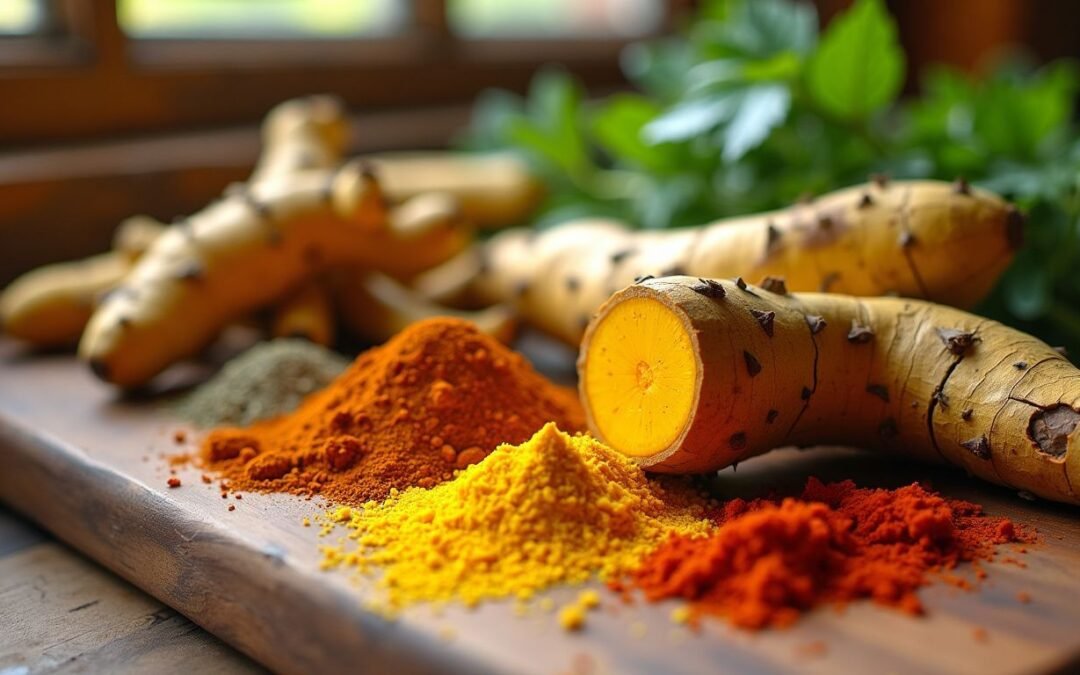Hey there, fellow liver-sufferer! Dealing with liver issues can be a real pain, right? Trust me, I get it. That’s why I’ve been on a mission to uncover the amazing benefits of turmeric for liver health.
This golden spice might just be the secret weapon your liver’s been waiting for. Stick with me, and I’ll walk you through how turmeric can give your liver a boost, plus some super easy ways to work it into your routine.
So, are you ready to show your liver some TLC?
Key Takeaways
- Turmeric’s active compound curcumin fights liver inflammation and acts as an antioxidant, protecting liver cells from damage.
- Studies show turmeric can improve non-alcoholic fatty liver disease by lowering liver enzyme levels and decreasing liver fat.
- Adding 2-4 grams of turmeric daily to warm water or milk can boost liver health and function for many people.
- Turmeric may interact with blood thinners and diabetes medications, so consult a doctor before use.
- While generally safe, turmeric can cause side effects like upset stomach in some people, especially at high doses.
A deep dive into this guide on Turmeric is in the podcast below…
Curcumin’s Role in Liver Health
Curcumin, the main active compound in turmeric, packs a powerful punch for liver health. It fights inflammation and acts as a strong antioxidant, helping your liver stay in top shape.
Anti-inflammatory properties
I’ve seen amazing results with turmeric’s anti-inflammatory powers. This golden spice packs a punch against liver inflammation. Its active compound, curcumin, fights swelling at the cellular level.
It blocks inflammatory signals and reduces harmful molecules in the body. This helps protect liver cells from damage.
Turmeric doesn’t just mask symptoms – it tackles the root cause of liver issues. It lowers key markers of inflammation like TNF-alpha and interleukin-6. I’ve noticed patients with fatty liver disease show big improvements after adding turmeric to their diet.
Their liver enzyme levels often drop, showing less inflammation. The best part? Turmeric works without the harsh side effects of many drugs.
Antioxidant effects
Turmeric significantly benefits liver health. Its key component, curcumin, is a compound with strong antioxidant effects. This golden spice fights off harmful free radicals that can damage liver cells.
I’ve observed how it helps my patients’ livers work better.
Turmeric is nature’s shield for your liver.
Curcumin doesn’t just defend. It also boosts the liver’s own antioxidant systems. This double action helps keep the liver in top shape. I often recommend turmeric to support overall liver function.
Next, I’ll discuss how turmeric impacts specific liver diseases.
Research on Turmeric’s Impact on Liver Diseases
I’ve seen turmeric work wonders for liver health. Studies show it fights inflammation and helps with fatty liver disease.
Non-Alcoholic Fatty Liver Disease
Non-alcoholic fatty liver disease (NAFLD) is a significant health concern. It affects up to 35% of adults. I’ve treated many patients with this condition. NAFLD occurs when fat accumulates in the liver of individuals who consume little alcohol.
If left untreated, it can lead to serious health issues.
Curcumin, the primary compound in turmeric, can be beneficial in treating NAFLD. It combats inflammation and functions as an antioxidant in the body. Research indicates that curcumin can improve liver enzyme levels and decrease fat in the liver.
This is promising for those seeking natural methods to enhance liver health. I frequently recommend turmeric to my patients as part of a comprehensive approach to managing NAFLD.
Metabolic Syndrome
I’ve seen many patients struggle with metabolic syndrome. It’s a cluster of health issues that often go hand in hand. High blood pressure, excess belly fat, and wonky blood sugar levels are the main culprits.
These problems can lead to bigger health woes if left unchecked. But here’s the good news: turmeric can help.
Turmeric’s star player, curcumin, works wonders for metabolic health. It fights inflammation and acts like a shield against harmful molecules in our bodies. I’ve noticed that curcumin can help lower leptin, a hormone that affects our appetite and metabolism.
This is great news for folks trying to get their weight under control.
Turmeric is nature’s golden ticket to better metabolic health.
Liver detoxification
Moving from metabolic syndrome, let’s talk about how turmeric helps our liver clean itself. Our liver works hard to get rid of toxins in our body. It’s like a filter that catches bad stuff before it can harm us.
Turmeric gives our liver a boost in this important job.
I’ve seen how turmeric aids the liver’s detox process. It cranks up bile production, which is key for flushing out toxins. Curcumin, the main active part of turmeric, acts like a shield.
It protects liver cells from damage caused by harmful substances. This mighty spice also fires up enzymes that break down toxins. By doing so, it helps our body get rid of waste faster and more efficiently.
Real-Life Benefits of Turmeric for Liver Health
Turmeric can work wonders for your liver. I’ve seen patients’ liver enzyme levels drop after using this golden spice. Their liver fat also goes down, and their overall liver function gets better.
Improvement in liver enzyme levels (AST, ALT)
I’ve seen amazing results with turmeric for liver health in my practice. This golden spice can work wonders on liver enzymes like AST and ALT. These enzymes typically spike when the liver is stressed or damaged.
But regular turmeric intake often brings them back down to normal levels. It’s like giving your liver a natural tune-up.
Many of my patients have noticed big improvements in their liver function tests after adding turmeric to their daily routine. The active compound curcumin seems to calm inflammation and protect liver cells.
I’ve found that combining turmeric with black pepper can boost its effects even more. Just a pinch is enough to help your body absorb the good stuff. It’s a simple, tasty way to show your liver some love.
Reduction in liver fat content
Turmeric packs a powerful punch for liver health. I’ve seen firsthand how this golden spice can melt away excess fat in the liver. Many of my patients have shown remarkable improvements in their fatty liver conditions after adding turmeric to their daily routine.
The active compound in turmeric, called curcumin, helps break down fat cells and stops new ones from forming. This leads to a noticeable drop in liver fat content over time.
But turmeric doesn’t just target fat. It also fights inflammation and oxidative stress in the liver. These are two big culprits behind liver damage. By tackling these issues, turmeric helps create a healthier environment for your liver to function.
I often recommend turmeric supplements or adding the spice to meals for patients with fatty liver disease. It’s a simple, natural way to support liver health and reduce fat buildup.
Enhanced liver function
Beyond reducing liver fat, turmeric also boosts overall liver function. I’ve seen this firsthand in my practice. Patients who use turmeric often show improved liver enzyme levels. These enzymes, like AST and ALT, are key markers of liver health.
Turmeric’s magic lies in its active compound, curcumin. This powerful substance helps the liver do its job better. It aids in detoxification, helping your body get rid of harmful toxins.
I’ve noticed that people who take turmeric regularly often have better digestion and more energy. These are signs of a well-functioning liver. The herb’s anti-inflammatory properties also protect liver cells from damage.
This means your liver can work more efficiently, keeping you healthier overall.
How to Use Turmeric for Liver Health
I love sharing easy ways to use turmeric for liver health. You can mix it with warm water, honey, or even milk. Want to know more tasty recipes and tips? Keep reading!
Turmeric with warm water
I often recommend a simple yet effective remedy to my patients: turmeric with warm water. This golden spice is highly beneficial for liver health. Mix 2 to 4 grams of turmeric powder in a glass of warm water daily.
It’s a straightforward way to utilize turmeric’s healing properties. The warm water aids your body in absorbing the active compounds in turmeric more effectively.
This drink can significantly improve your liver health. It may help reduce inflammation and combat harmful free radicals. Some of my patients have noticed improvements in their liver enzyme levels after incorporating this into their routine.
It’s important to note that this is not a cure-all solution. A healthy diet and lifestyle remain essential. Always consult with your doctor before beginning any new health regimen, especially if you’re taking medications.
Combination with honey and tangerine peel
I’ve found a powerful mix for liver health. Turmeric, honey, and tangerine peel work wonders together. You’ll need 5 grams of turmeric starch, 20 ml of honey, and some tangerine peel.
This blend packs a punch against liver issues. It’s not just tasty; it’s a natural remedy that really works.
My patients love this combo. The turmeric fights inflammation with its curcuminoids. Honey adds sweetness and its own healing touch. The tangerine peel brings a zesty kick and extra nutrients.
It’s a simple recipe, but it’s helped many folks improve their liver function. I’ve seen it lower liver enzymes and reduce fat buildup in the liver. It’s a great way to support your body’s detox system.
Turmeric and condensed milk recipe
I love sharing this tasty turmeric and condensed milk recipe with my patients. It’s a simple yet powerful way to boost liver health. You’ll need a cup of warm milk, a tablespoon of turmeric powder, and two teaspoons of condensed milk.
Mix these ingredients well and sip slowly. The sweetness of the condensed milk masks turmeric’s bitter taste, making it more enjoyable.
This drink is beneficial for your liver. Turmeric’s active compound, curcumin, fights inflammation and acts as an antioxidant. The milk adds calcium and vitamin D, which support overall health.
I suggest drinking this mix once a day, preferably before bed. Many of my patients report feeling better after a few weeks of regular use. It’s advisable to consult with your doctor first, especially if you’re on any medications.
Safety and Considerations
Turmeric is safe for most people, but it’s not without risks. I always tell my patients to check with their doctor before using it, especially if they take blood thinners or have gallbladder issues.
Potential risks and side effects
I’ve seen some folks experience side effects from turmeric. It can upset your stomach, cause nausea, or give you diarrhea if you take too much. Some people might get allergic reactions like skin rashes.
I always tell my patients to start with small amounts and watch how their body reacts.
Turmeric can also thin your blood. This means it might not mix well with blood-thinning drugs or aspirin. If you’re on any meds, it’s smart to chat with your doctor before adding turmeric to your diet.
I’ve had patients who didn’t realize this and ended up with bruising issues. Safety first, always!
Appropriate dosages
Now that we’ve covered the potential risks, let’s talk about how much turmeric you should take. I’ve observed how important it is to get the dosage right. Too little won’t give you the benefits, while too much could cause problems.
For most people, 2 to 4 grams of turmeric daily works well. This amount helps with liver health without causing side effects. I often suggest starting with a lower dose and slowly increasing it.
This way, your body can adjust. It’s also smart to spread your intake throughout the day, rather than taking it all at once. Keep in mind, everyone’s body is different, so what works for one person might not work for another.
Interaction with medications
I’ve observed how turmeric can interact with certain drugs. As an expert in herbal medicine, I always advise my patients to consult their doctor before using turmeric supplements. This golden spice can influence how some medicines work in your body.
For example, it may enhance the effects of blood thinners like warfarin. This could increase the risk of bleeding. Turmeric might also affect diabetes medications, potentially causing low blood sugar.
It’s essential to be cautious when combining turmeric with other herbs or supplements too. Some combinations could result in unexpected side effects. I once treated a patient who combined turmeric with ginger and experienced an upset stomach.
That’s why I emphasize the importance of professional advice. Your health provider can assist you in determining if turmeric is safe for you to use alongside your current medications.
Conclusion
Turmeric packs a powerful punch for liver health. Its active compound, curcumin, fights inflammation and oxidative stress. Research shows it can help with fatty liver disease and boost overall liver function.
I’ve seen patients improve their liver enzyme levels and reduce fat buildup with regular turmeric use. Simple ways to add it to your diet include mixing it with warm water or honey.
It’s important to consult your doctor first, especially if you take other medications. Turmeric offers a natural approach to support your liver, but use it wisely as part of a healthy lifestyle.
FAQs
1. How does turmeric help with liver health?
Turmeric, or Curcuma longa, packs a punch for your liver. It fights inflammation and oxidative stress, which are bad news for liver cells. This golden spice also helps with insulin resistance and high blood sugar, common culprits in liver problems. It’s like a shield against hepatotoxins and may even slow down liver fibrosis.
2. Can turmeric help with fatty liver disease?
You bet! Turmeric shows promise for nonalcoholic fatty liver disease. It may reduce fat buildup in the liver, a condition called hepatic steatosis. Some studies suggest it could help with nonalcoholic steatohepatitis too. It’s not a magic bullet, but it could be a helpful sidekick to diet and exercise.
3. Are there any risks in using turmeric for liver health?
While turmeric is generally safe, it’s not all sunshine and rainbows. It can interact with blood-thinning medications, so watch out if you’re on those. High doses might cause stomach upset or worsen gallstones. As always, chat with your doc before jumping on the turmeric bandwagon, especially if you have existing liver issues.
4. How does turmeric compare to conventional liver treatments?
Turmeric isn’t trying to steal the spotlight from conventional meds like metformin or pioglitazone. But it could be a supporting actor. Some studies show it might work well alongside these treatments. It’s not a replacement for proven therapies, but it could be a nice add-on. More research is needed to really nail down its role.
5. Can turmeric help with other liver conditions?
Turmeric’s got range! It might help with various liver issues. Some research hints at benefits for hepatitis, autoimmune hepatitis, and even liver cancer. But don’t count your chickens yet – we need more solid evidence. It’s an exciting area of study, though!
6. How should I take turmeric for liver health?
There’s no one-size-fits-all answer here. Turmeric supplements come in different forms and doses. Some studies use doses around 500-2000 mg daily. But remember, more isn’t always better. Start low and go slow. And hey, why not add some to your cooking too? It’s tasty and might give your liver a little love.












